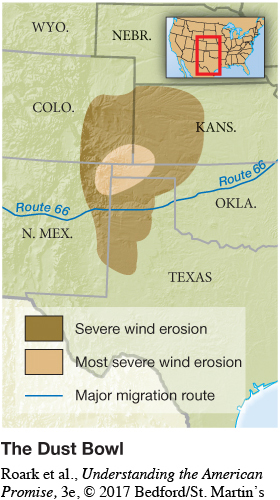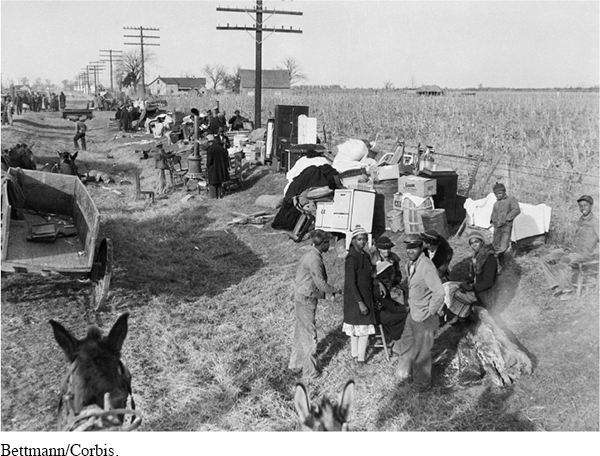Casualties in the Countryside
The AAA weathered critical battering by champions of the old order better than the NRA. Allotment checks for keeping land fallow and crop prices high created loyalty among farmers with enough acreage to participate. As a white farmer in North Carolina declared, “I stand for the New Deal and Roosevelt . . . , the AAA . . . and crop control.”
Protests stirred, however, among those who did not qualify for allotments. The Southern Farm Tenants Union argued passionately that the AAA enriched large farmers while it impoverished small farmers who rented rather than owned their land. One black sharecropper explained why only $75 a year from New Deal agricultural subsidies trickled down to her: “De landlord is landlord, de politicians is landlord, de judge is landlord, de shurf [sheriff] is landlord, ever’body is landlord, en we [sharecroppers] ain’ got nothin’!” Like the NRA, the AAA tended to help most those who least needed help. Roosevelt’s political dependence on southern Democrats caused him to avoid confronting economic and racial inequities in the South.
> COMPARE AND CONTRAST
How and why did criticism of the AAA differ from that directed at the NRA? What, if anything, did these two New Deal programs have in common?

Displaced tenants often joined the army of migrant workers who straggled across rural America during the 1930s, some to flee Great Plains dust storms. Many migrants came from Mexico to work Texas cotton, Michigan beans, Idaho sugar beets, and California crops of all kinds. But since the number of people willing to take agricultural jobs usually exceeded the number of jobs available, wages fell and native-born white migrants fought to reserve even these low-wage jobs for themselves. Hundreds of thousands of “Okies” streamed out of the Dust Bowl of Oklahoma, Kansas, Texas, and Colorado, where chronic drought and harmful agricultural practices blasted crops and hopes. Parched, poor, and windblown, Okies—like the Joad family immortalized in John Steinbeck’s novel The Grapes of Wrath (1939)—migrated to the lush fields and orchards of California, congregating in labor camps and hoping to find work and a future. But migrant laborers seldom found steady or secure work. As one Okie said, “When they need us they call us migrants, and when we’ve picked their crop, we’re bums and we got to get out.”[[LP Photo: P24.05 Evicted Sharecroppers/

Understanding the American Promise 3ePrinted Page 688
Section Chronology